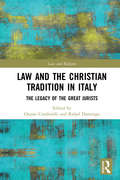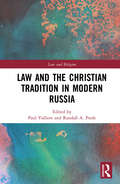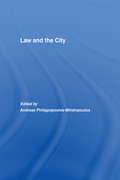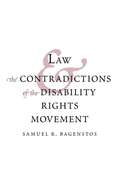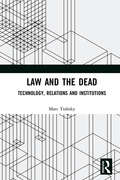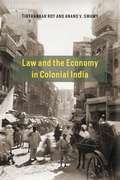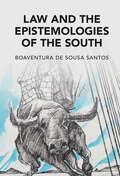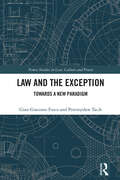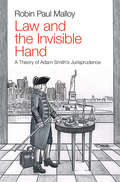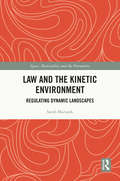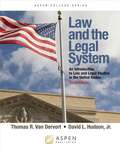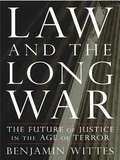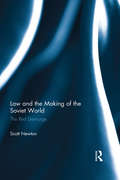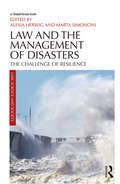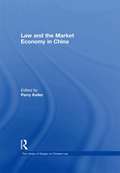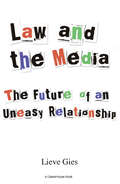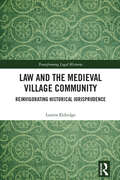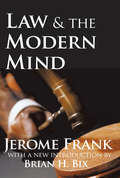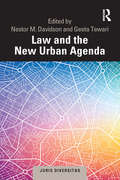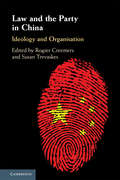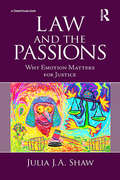- Table View
- List View
Law and the Christian Tradition in Italy: The Legacy of the Great Jurists (Law and Religion)
by Rafael Domingo Orazio CondorelliFirmly rooted on Roman and canon law, Italian legal culture has had an impressive influence on the civil law tradition from the Middle Ages to present day, and it is rightly regarded as "the cradle of the European legal culture." Along with Justinian’s compilation, the US Constitution, and the French Civil Code, the Decretum of Master Gratian or the so-called Glossa ordinaria of Accursius are one of the few legal sources that have influenced the entire world for centuries. This volume explores a millennium-long story of law and religion in Italy through a series of twenty-six biographical chapters written by distinguished legal scholars and historians from Italy and around the world. The chapters range from the first Italian civilians and canonists, Irnerius and Gratian in the early twelfth century, to the leading architect of the Second Vatican Council, Pope Paul VI. Between these two bookends, this volume offers notable case studies of familiar civilians like Bartolo, Baldo, and Gentili and familiar canonists like Hostiensis, Panormitanus, and Gasparri but also a number of other jurists in the broadest sense who deserve much more attention especially outside of Italy. This diversity of international and methodological perspectives gives the volume its unique character. The book will be essential reading for academics working in the areas of Legal History, Law and Religion, and Constitutional Law and will appeal to scholars, lawyers, and students interested in the interplay between religion and law in the era of globalization.
Law and the Christian Tradition in Modern Russia (Law and Religion)
by Paul Valliere and Randall A. PooleThis book, authored by an international group of scholars, focuses on a vibrant central current within the history of Russian legal thought: how Christianity, and theistic belief generally, has inspired the aspiration to the rule of law in Russia, informed Russian philosophies of law, and shaped legal practices. Following a substantial introduction to the phenomenon of Russian legal consciousness, the volume presents twelve concise, non-technical portraits of modern Russian jurists and philosophers of law whose thought was shaped significantly by Orthodox Christian faith or theistic belief. Also included are chapters on the role the Orthodox Church has played in the legal culture of Russia and on the contribution of modern Russian scholars to the critical investigation of Orthodox canon law. The collection embraces the most creative period of Russian legal thought—the century and a half from the later Enlightenment to the Russian emigration following the Bolshevik Revolution. This book will merit the attention of anyone interested in the connections between law and religion in modern times.
Law and the City: Theorising Environmental Law And The City (Law, Science And Society Ser.)
by Andreas Philippopoulos-MihalopoulosLaw and the City offers a lateral, critical and often unexpected description of some of the most important cities in the world, including Moscow, Istanbul, Berlin, Singapore, Athens, Mexico City, Toronto, Sydney, Johannesburg: each one from a distinctive legal perspective. An invaluable 'guide' to adopting a different approach to the city and its history, culture and everyday experience, Law and the City is not simply an exploration of the relationship between these two spheres. It details: a flourishing of law’s spatiality and urban legal locality an unfolding of both the juridical urban body and the city’s legal dreams, of both the ‘urban law’ and the ‘juridical polis’. Enlightening and at the same time problematizing the reader, this volume is an innovative collection of truly global dimensions that will prove compelling reading both for specialists and for critical travellers.
Law and the Contradictions of the Disability Rights Movement
by Samuel R. BagenstosThe passage of the Americans with Disabilities Act in 1990 was hailed as revolutionary legislation, but in the ensuing years restrictive Supreme Court decisions have prompted accusations that the Court has betrayed the disability rights movement. The ADA can lay claim to notable successes, yet people with disabilities continue to be unemployed at extremely high rates. In this timely book, Samuel R. Bagenstos examines the history of the movement and discusses the various, often-conflicting projects of diverse participants. He argues that while the courts deserve some criticism, some may also be fairly aimed at the choices made by prominent disability rights activists as they crafted and argued for the ADA. The author concludes with an assessment of the limits of antidiscrimination law in integrating and empowering people with disabilities, and he suggests new policy directions to make these goals a reality.
Law and the Dead: Technology, Relations and Institutions
by Marc TrabskyThe governance of the dead in the eighteenth and nineteenth centuries gave rise to a new arrangement of thanato-politics in the West. Legal, medical and bureaucratic institutions developed innovative technologies for managing the dead, maximising their efficacy and exploiting their vitality. Law and the Dead writes a history of their institutional life in the nineteenth and twentieth centuries. With a particular focus on the technologies of the death investigation process, including place-making, the forensic gaze, bureaucratic manuals, record-keeping and radiography, this book examines how the dead came to be incorporated into legal institutions in the modern era. Drawing on the writings of philosophers, historians and legal theorists, it offers tools for thinking through how the dead dwell in law, how their lives persist through the conduct of office, and how coroners assume responsibility for taking care of the dead. This historical and interdisciplinary book offers a provocative challenge to conventional thinking about the sequestration of the dead in the nineteenth and twentieth centuries. It asks the reader to think through and with legal institutions when writing a history of the dead, and to trace the important role assumed by coroners in the governance of the dead. This book will be of interest to scholars working in law, history, sociology and criminology.
Law and the Economy in Colonial India
by Tirthankar Roy Anand V. SwamySince the economic reforms of the 1990s, India's economy has grown rapidly. To sustain growth and foreign investment over the long run requires a well-developed legal infrastructure for conducting business, including cheap and reliable contract enforcement and secure property rights. But it's widely acknowledged that India's legal infrastructure is in urgent need of reform, plagued by problems, including slow enforcement of contracts and land laws that differ from state to state. How has this situation arisen, and what can boost business confidence and encourage long-run economic growth? Tirthankar Roy and Anand V. Swamy trace the beginnings of the current Indian legal system to the years of British colonial rule. They show how India inherited an elaborate legal system from the British colonial administration, which incorporated elements from both British Common Law and indigenous institutions. In the case of property law, especially as it applied to agricultural land, indigenous laws and local political expediency were more influential in law-making than concepts borrowed from European legal theory. Conversely, with commercial law, there was considerable borrowing from Europe. In all cases, the British struggled with limited capacity to enforce their laws and an insufficient knowledge of the enormous diversity and differentiation within Indian society. A disorderly body of laws, not conducive to production and trade, evolved over time. Roy and Swamy's careful analysis not only sheds new light on the development of legal institutions in India, but also offers insights for India and other emerging countries through a look at what fosters the types of institutions that are key to economic growth.
Law and the Epistemologies of the South (Cambridge Studies in Law and Society)
by Boaventura de Sousa SantosModern state law excludes populations, peoples, and social groups by making them invisible, irrelevant, or dangerous. In this book, Boaventura de Sousa Santos offers a radical critique of the law and develops an innovative paradigm of socio-legal studies which is based on the historical experience of the Global South. He traces the history of modern law as an abyssal law, or a kind of law that is theoretically invisible yet implements profound exclusions in practice. This abyssal line has been the key procedure used by modern modes of domination – capitalism, colonialism, and patriarchy – to divide people into two groups, the metropolitan and the colonial, or the fully human and the sub-human. Crucially, de Sousa Santos rejects the decadent pessimism that claims that we are living through 'the end of history'. Instead, this book offers practical, hopeful alternatives to social exclusion and modern legal domination, aiming to make post-abyssal legal utopias a reality.
Law and the Exception: Towards a New Paradigm (Nomos Studies in Law, Culture and Power)
by Przemysław Tacik Gian-Giacomo FuscoThis book proposes a paradigm shift in the way that ‘the state of exception’–as it is usually named in legal and political theory–is to be understood. Building on the assumption that the exception is a heuristic idea that is still a relevant category for a critical deconstruction of law, this book argues that it needs to be rethought outside the boundaries of its traditional understanding. To this end, the book offers two strategies. First, it develops the ideas of ‘exceptionality’ and ‘exceptionalisation’ in order to grasp how measures, norms and mechanisms that clearly have an exceptional character are no longer confined within the boundaries of classic institutions such as the state of exception, martial law, the state of emergency and so on. As demonstrated recently during the COVID-19 pandemic, legal systems may dissimulate the exceptional as the normal, avoiding the use of formal states of exception and adopting measures that are of exceptional nature. This book maintains that it is necessary to think of ‘exceptionality’ outside of its usual legal footholds. Emergency laws are considered here as part of a more general sphere of exceptionality that must be understood as the product of a process of the accumulation of symbols, practices, notions and images that are only partially expressed through law, despite having long populated the legal imagination. Second, the book offers an analysis of the inner exceptional life of liberal constitutionalism: the subterranean authoritarian drives dissimulated by the rule of law.This book will interest scholars and researchers in legal and political theory, as well as continental philosophy.
Law and the Formation of Modern Europe:
by Chris Thornhill Mikael Rask MadsenLaw and the Formation of Modern Europe explores processes of legal construction in both the national and supranational domains, and it provides an overview of the modern European legal order. In its supranational focus, it examines the sociological pressures which have given rise to European public law, the national origins of key transnational legal institutions and the elite motivations driving the formation of European law. In its national focus, it addresses legal questions and problems which have assumed importance in parallel fashion in different national societies, and which have shaped European law more indirectly. Examples of this are the post-1914 transformation of classical private law, the rise of corporatism, the legal response to the post-1945 legacy of authoritarianism, the emergence of human rights law and the growth of judicial review. This two-level sociological approach to European law results in unique insights into the dynamics of national and supranational legal formation.
Law and the Invisible Hand: A Theory of Adam Smith's Jurisprudence
by Robin Paul MalloyA contemporary interpretation of Adam Smith's work on jurisprudence, revealing Smith's belief that progress emerges from cooperation and a commitment to justice. In Smith's theory, the tension between self–interest and the interests of others is mediated by law, so that the common interest of the community can be promoted. Moreover, Smith informs us that successful societies do at least three things well. They promote the common interest, advance justice through the rule of law, and they facilitate our natural desire to truck, barter, and exchange. In this process, law functions as an invisible force that holds society together and keeps it operating smoothly and productively. Law enhances social cooperation, facilitates trade, and extends the market. In these ways, law functions like Adam Smith's invisible hand, guiding and facilitating the progress of humankind.
Law and the Kinetic Environment: Regulating Dynamic Landscapes (Space, Materiality And The Normative Ser.)
by Sarah MarusekThis book addresses the legal-geographical implications of the fact that landscapes are not static, but dynamic. Within the field of legal geography, the spatial relationship of law to landscape is usually considered to be static. Environments are often considered fixed, and consequently inert, as places that literally don’t go anywhere. Typically, then, it is what happens in these places, rather than the place itself, that commands academic attention. In contrast to this static viewpoint, Law and the Kinetic Environment considers how many landscapes are in flux and, as a result, may be seen as dynamic. Natural phenomena, such as oozing lava, moving glaciers, or bubbling geothermal pools, challenge and test the normative conceptualizations of stability of place, property ownership, and legal regulation. Consequently, such dynamic landscapes enliven and transform law, offering new jurisprudential insights into what law is and how it operates in response to the kineticism that, this book argues is, to some degree, inherent in all landscapes. This original engagement with legal geography will appeal to those with general interests in this area, as well as specific concerns with questions of law and place, property and the environment.
Law and the Legal System: An Introduction to Law and Legal Studies in the United States (Aspen College Series)
by David L. Hudson Thomas R. Van DervortDesigned to teach the basics needed to prepare students for any role in the legal system, Law and the Legal System engages students through the use of examples and practical applications of legal principles. Whether they are interested in pursuing legal careers as lawyers or paralegals, or political science careers, or criminal justice interests, students are provided a basic understanding of the law and how to find it. Mock trial experiences are encouraged, and each chapter involves the student in exercises that review understanding of legal terms and concepts. Six cases in an appendix illustrate basic concepts, and hypothetical cases showcase the inner workings of the judicial system in both criminal and civil cases. Internet sources, key terms, case excerpts, research assignments, review exercises and discussion questions help students reinforce the key concepts in each chapter, and suggested activities engage students in discovery projects. Thoroughly updated, the revised Third Edition expands coverage with new chapters on Legal Research and Writing, Tort Law, Contract Law, Family Law, Employment Law, and Equal Protection Law. Careful updating of information throughout the book includes refreshed Internet references to the text.
Law and the Long War
by Benjamin WittesAn authoritative assessment of the new laws of war and a sensible and sophisticated roadmap for the future of liberty in the Age of Terror America is losing a crucial front in the ongoing war on terror. It is losing not to Al Qaeda, but to its own failure to construct a set of laws that will protect the American people during this global conflict. As debate continues to rage over the legality and ethics of war, Benjamin Wittes enters the fray with a sober-minded exploration of law in wartime that is definitive, accessible, and nonpartisan. Outlining how this country came to its current impasse over human rights and counterterrorism, Law and the Long War paves the way toward fairer, more accountable rules for a conflict without end. .
Law and the Making of the Soviet World: The Red Demiurge
by Scott NewtonThis book is an unconventional reappraisal of Soviet law: a field that is ripe for re-evaluation, now that it is clear of Cold War cobwebs; and, as this book shows, one that is surprisingly topical and newly compelling. Scott Newton argues here that the Soviet order was a work of law. Drawing on a wide range of sources – including Russian-language Soviet statues and regulations, jurisprudence, legal theory, and English-language ‘legal Kremlinology’ – this book analyses the central significance of law in the design and operation of Soviet economic, political, and social institutions. In arguing that it was an exemplary, rather than aberrant, case of the uses to which law was put in twentieth-century industrialised societies, Law and the Making of the Soviet World: The Red Demiurge provides an insightful account of both the significance of modern law in the Soviet case and the significance of the Soviet case for modern law.
Law and the Management of Disasters: The Challenge of Resilience (Law, Science and Society)
by Marta Simoncini Alexia HerwigDisasters raise serious challenges for contemporary legal orders: they demand significant management, but usually amidst massive disruption to the normal functioning of state authority and society. When dealing with disasters, law has traditionally focused on contingency planning and recovery. More recently, however, ‘resilience’ has emerged as a key concept in effective disaster management policies and strategies, aiming at minimising the impact of events, so that the normal functioning of society and the state can be preserved. This book analyses the contribution of law to resilience building by looking at law’s role in the different phases of the disaster regulatory process: risk assessment, risk management, emergency intervention, and recovery. More specifically, it addresses how law can effectively contribute to resilience-oriented distaster management policies, and what legal instruments can support effective resilience-building.
Law and the Market Economy in China (The\library Of Essays On Chinese Law Ser.)
by Perry KellerThis volume concerns several aspects of China's changing market based economy. These include commercial contract enforcement, corporate structures, competition law and other issues related to China's membership in the WTO. In the past two decades, the rapid integration of China's economy into the global marketplace has created obligations and expectations of non-discrimination and regulatory transparency in domestic markets. The Chinese government has responded by demanding better governance within major companies, market sectors and public administration generally. However, as the articles in this volume show, it has struggled to find a corporate structure capable of absorbing external equity investment and participation but still amenable to direct and indirect state guidance. It has also moved cautiously in creating legal controls over unfair competition. Moreover, the protection of state owned enterprises, which serve as vehicles for domestic economic, social and political policy, has been a recurring issue in China's WTO trade disputes.
Law and the Media: The Future of an Uneasy Relationship
by Lieve GiesIntroducing readers to the study of law, media and popular culture, this text, using three original case studies, re-examines the assumptions underpinning existing research and suggests alternatives. Arguing that the study of law, media and popular culture should be embedded in the sociology of everyday life, the author focuses on four specific topics, in which there is scope for further development. These are the facts that: the current literature in this field predominantly focuses on crime, neglecting the way the media portrays less spectacular, more run-of-the-mill legal topics fiction, primarily, has captured scholars' attention, with remarkably less being paid to representations of law, other than crime, in factual media textual analysis continues to be the preferred method in the study of law and the media the literature is dominated by a fear of corrosive media effects, while the potential of the media and popular culture to improve public legal knowledge, facilitate access to justice and promote legal change remains largely undocumented. Exploring the often uneasy relationship between law and popular culture from specific socio-legal perspectives, including systems theory, semiotics of law and legal pluralism, this book is an essential read for those studying and researching in this area.
Law and the Medieval Village Community: Reinvigorating Historical Jurisprudence (Transforming Legal Histories)
by Lorren EldridgeThis book expands on established doctrine in legal history and sets out a challenge for legal philosophers. The English medieval village community offers a historical and philosophical lens on the concept of custom which challenges accepted notions of what law is. The book traces the study of the medieval village community from early historical works in the nineteenth century through to current research. It demonstrates that some law-making can and has been ‘bottom-up’ in English law, with community-led decisionmaking having a particularly important role in the early common law. The detailed consideration of law in the English village community reveals alternative ways of making and conceiving of law which are not dependent on state authority, particularly in relation to customary and communal property rights. Acknowledging this poses challenges for legal theory: the legal positivism that dominates Western legal philosophy tends to reject custom as a source of law. However, this book argues that medieval customary law ought to be considered ‘law’ if we are ever going to fully understand law – both then and now. The book will be a valuable resource for researchers and academics working in the areas of Legal History, Legal Theory, and Jurisprudence.
Law and the Modern Mind
by Brian H. Bix Jerome FrankLaw and the Modern Mind first appeared in 1930 when, in the words of Judge Charles E. Clark, it "fell like a bomb on the legal world." In the generations since, its influence has grown-today it is accepted as a classic of general jurisprudence.The work is a bold and persuasive attack on the delusion that the law is a bastion of predictable and logical action. Jerome Frank's controversial thesis is that the decisions made by judge and jury are determined to an enormous extent by powerful, concealed, and highly idiosyncratic psychological prejudices that these decision-makers bring to the courtroom.
Law and the Modern Mind
by Brian H. Bix Jerome FrankLaw and the Modern Mind first appeared in 1930 when, in the words of Judge Charles E. Clark, it "fell like a bomb on the legal world." In the generations since, its influence has grown-today it is accepted as a classic of general jurisprudence.The work is a bold and persuasive attack on the delusion that the law is a bastion of predictable and logical action. Jerome Frank's controversial thesis is that the decisions made by judge and jury are determined to an enormous extent by powerful, concealed, and highly idiosyncratic psychological prejudices that these decision-makers bring to the courtroom.
Law and the Modern Mind: Consciousness and Responsibility in American Legal Culture
by Susanna L. BlumenthalHeadline-grabbing murders are not the only cases in which sanity has been disputed in the American courtroom. Susanna Blumenthal traces this litigation, revealing how ideas of human consciousness, agency, and responsibility have shaped American jurisprudence as judges struggled to reconcile Enlightenment rationality with new sciences of the mind.
Law and the New Logics
by Smith Glenn H. Patrick Lionel D.This book is unique in presenting an interdisciplinary conversation between jurists and logicians. It brings together scholars from both law and philosophy and looks at the application of 'the new logics' to law and legal ordering, in a number of legal systems. The first Part explores the ways in which the new logics shed light on the functioning of legal orders, including the structure of legal argumentation and the rules of evidence. The second addresses how non-classical logics can help us to understand the interactions between multiple legal orders, in a range of contexts including domestic and international law. The final Part examines particular issues in the applicability of non-classical logics to legal reasoning. This book will be of interest to jurisprudence and logic scholars and students who want to deepen their understanding of relationships between law and legal reasoning, and learn about recent developments in formal logic.
Law and the New Urban Agenda: A Comparative Perspective (Juris Diversitas)
by Nestor M. Davidson Geeta TewariThe New Urban Agenda (NUA), adopted in 2016 at the United Nations Conference on Housing and Sustainable Urban Development (Habitat III) in Quito, Ecuador, represents a globally shared understanding of the vital link between urbanization and a sustainable future. At the heart of this new vision stand a myriad of legal challenges – and opportunities – that must be confronted for the world to make good on the NUA’s promise. In response, this book, which complements and expands on the editors’ previous volumes on urban law in this series, offers a constructive and critical evaluation of the legal dimensions of the NUA. As the volume’s authors make clear, from natural disasters and resulting urban migration in Honshu and Tacloban, to innovative collaborative governance in Barcelona and Turin, to accessibility of public space for informal workers in New Delhi and Accra, and power scales among Brazil’s metropolitan regions, there is a deep urgency for thoughtful research to understand how law can be harnessed to advance the NUA’s global mission of sustainable urbanism. It thus creates a provocative and academic dialogue about the legal effects of the NUA, which will be of interest to academics and researchers with an interest in urban studies.
Law and the Party in Xi Jinping's China: Ideology and Organization
by Susan Trevaskes Rogier CreemersIn the Xi Jinping era, it has become clear that the rule of law, as understood in the West, will not appear in China soon. But was this ever a likely option? This book argues China's legal system needs to be studied from an internal perspective, to take into account the characteristic architecture of China's Party-state. To do so, it addresses two key elements: ideology and organisation. Part One of the book discusses ideology and the law, exploring how the Chinese Communist Party conceives of the nature of law and its position within its broader range of policy tools. Part Two, on organisation and the law, reviews how these ideological principles manifest themselves in the application of law, as well as the reform of the Party-state. As such, it highlights how the Party's plans and approaches run counter to mainstream theoretical expectations, and advocates a greater attention to the inherent logic of the system itself.
Law and the Passions: Why Emotion Matters for Justice
by Julia J.A. ShawEngaging with the underlying social context in which emotions are a motivational force, Law and the Passions provides a uniquely inclusive commentary on the significance and influence of emotions in the history and continuing development of legal judgment, policy formation, legal practice and legal dogma. Although the emotionality of the law and the use of emotional tropes in legal discourse has become an established focus in recent scholarship, the extent to which emotion and the passions have informed decision-making, decision-avoidance and legal reasoning – rather than as simply an adjunct – is still a matter for critical analysis. As evidenced in a range of illustrative legal cases, emotions have been instrumental in the evolution of key legal principles and have produced many controversial judgments. Addressing the latent influence of fear, hate, love and compassion, the book explores the mutability of law and its transformative power, especially when faced with fluctuating social mores. The textual nature of law and the impact of literary forms on legal actors are also critically examined to further elucidate the idea of law-making as both rational and emotional, and significantly as an essential activity of the empathic imagination. To this end, it is suggested that critical scholarship on law, the passions and emotions not only advances our understanding of the inner workings of law, it constitutes a fundamental part of our moral reasoning, and has the capacity to articulate the conditions for a more dynamic, adaptable, ethical and effective legal institution. This interdisciplinary book will be of interest to scholars and students in the fields of law and literature, legal theory, legal philosophy, law and the humanities, legal aesthetics, sociology of law, politics, law and policy, human rights, general jurisprudence and social justice, as well as cultural studies.
